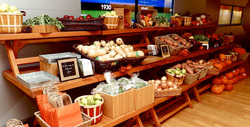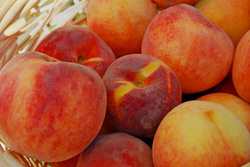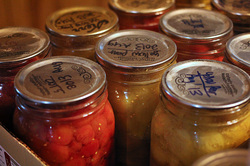
Here are 4 tips that can really help cut costs when it comes to buying organic:
Just this weekend, I was shocked at the prices for organic produce at a nearby major large grocery store. Refusing to buy lettuce for nearly $4/lb, I decided to save my salad-making plans for a later date, and check at Kroger next time, which I recalled also having a better organic selection anyway. My husband and I stopped in at Kroger today, and indeed, not only do they have an organic produce section that is nearly twice as large, their organic lettuce was less than half the price! They also had kale for the same price as the non-organic stuff at the other store, as well as several other very reasonably priced herbs and vegetables - many of which cost only around $0.20/lb more than their non-organic counterparts.
Don't assume organic produce costs the same at every grocery store - or even every location. Most grocery store chains price their products based on the area in which they are located. Shopping in an affluent area may cost you more than shopping at another store in the same chain in a less upscale neighborhood. Shop around and compare prices, and you should be able to find the stores that have better bargains on organic foods - then remember to shop there when buying organic.

The Environmental Working Group publishes a well-known annual guide to buying organic produce known as "The Dirty Dozen." Learn these items (or keep a list in your purse or wallet), and always buy these products organically grown. The matching list - "The Clean Fifteen" - lists items that are generally safe to purchase in their non-organic form.
As a general guideline, choose organic for items which you will consume the peel - think apples, peaches, strawberries, grapes, potatoes, tomatoes, peppers, etc., and leafy greens such as lettuce, spinach, and kale.
It is often okay to purchase non-organic versions of produce with a thick skin/rind which will be removed before eating - such as bananas, avocados, oranges, grapefruits, sweet corn, onions, pineapple, etc..
By only purchasing organic when it comes to the most polluted types of produce, you can save some dough and still avoid consuming so many harmful pesticides.
Tip #3: Shop Local
One of the greatest inventions I'm aware of is the concept of community supported agriculture. Basically this involves purchasing a "share" of a local farm's production for a specified period of time. Most CSAs operate on a seasonal basis. Depending on your area and local climate, that may be just for the summer, or for a specified number of months. By doing so, you are getting fresh, local produce in season (usually delivered to your door, or a convenient pick-up location) on a weekly or monthly basis, and supporting your local farmers at the same time. It's a win-win for all involved! (Visit our CSA page to learn more about community supported agriculture.)
While the CSA model originated in Europe, it has become incredibly popular throughout the U.S. over the past several years - and with good reason! People are able to re-connect with where their food comes from, get the freshest available foods (other than growing it yourself), build relationships within the local community, and often save money too. You may be surprised at all the CSA options that are now available. In my Central Ohio location, I am aware of options for fruit & vegetables (nearly year-round), flowers, herbs, honey, cheese, chocolate, bread, milk, meat, eggs, beans, flour, popcorn, natural soaps, teas, and more - all locally grown/produced, and delivered through the CSA model!
While not all CSA farms are organic, many of them are. This is a great way to save money on organic foods. A share is usually quite competitively priced, and if you are a meat-eater, it is especially worth-while to find a meat CSA in your area. (Meat is one of the most polluted foods you can eat if you go with the conventionally raised industrially produced kind.) Again, they may not be strictly organic, but most are at least naturally raised (meaning they may be fed non-organic foods, but typically are also fed lots of grass, and are not fed antibiotics or growth hormones), and the price will average out to less than you'd find organic meat for at most regular supermarkets.
If you can't find a CSA, or don't want a regular delivery, shopping at local farmer's markets can also give you access to fresh, organic produce at a reasonable price. (Bonus Savings Tip: Go towards the end of the day, when farmers may be wanting to unload their remaining produce at a discount so they don't have to take it home with them or throw it away.)
Tip #4: Buy In Bulk & Preserve for Later

While canning takes some education and may be somewhat daunting for some, freezing is a great way to keep foods fresh for a long period of time, and it's so easy anyone can do it! If you want to buy meat in bulk (e.g. a half of a beef, etc.), you will want to invest in a deep freezer, but this can save you a ton of money, and provide you with clean meat for quite some time to come.
Freezer bags are cheap and easy to come by, and many vegetables freeze very well - some without much preparation at all. I love to freeze peppers (both sweet and hot), and tomatoes. I don't even blanch them - just slice or dice, place in freezer bags, stack neatly, and freeze. Sweet corn, mushrooms, peas, and green beans are some other things that freeze well. Jam is very easy to make, and freezer jam even easier, if you want to preserve berries or other fruit. And refrigerator pickles (cucumbers, onions, garlic) are also quick and easy, and they keep for a long time in the refrigerator. You can even crack fresh eggs into freezer bags or containers and freeze them.
With these 4 money-saving tips in mind, you can reap all the benefits of eating organic, without it costing you an arm and a leg! (And indeed, the benefits of eating organic may well be worth that arm and leg anyway.) :-)
Now I'm off to put together a big salad of fresh organic lettuce, radishes, and avocado - all for around $3.00. Yum!
Rose.



 RSS Feed
RSS Feed